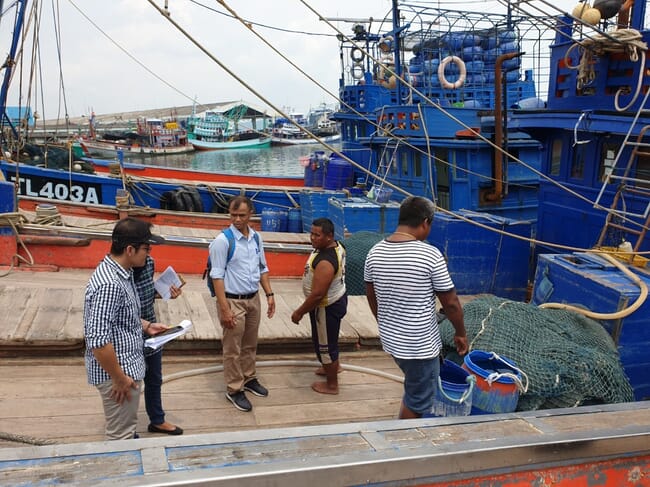
The organisation's interest in aquaculture supply chains extends to the vessels that catch fish ingredients used in aquaculture feeds © Seafood Task Force
Despite being in force since 2017, C.188 has so far only been ratified by an extremely limited number of countries. This critical international agreement aims to protect the rights of all people working in the seafood supply chain – including aquaculture operators – and ensure that they are working safely. It sets out binding minimum requirements relating to occupational safety and health, rest periods, written work agreements, and social security protection, as well as providing for regulation of the recruitment process and investigation of complaints by fishers. With only a few countries having ratified the convention, many workers in supply chains for SEA Alliance member companies are not yet covered by these essential protections.
“The SEA Alliance is focused on improving labour standards across seafood supply chains, both in wild capture fisheries and aquaculture. Our interest in aquaculture supply chains extends to the vessels that catch fish ingredients used in aquaculture feeds. Working collectively is critical in those supply chains where individual companies will struggle to effect change working alone,” Andy Hickman, head of SEA Alliance programme, explained to The Fish Site.
“The SEA Alliance is writing to over 25 countries that are involved in our seafood supply chains and haven’t yet ratified and implemented C.188. Sourcing countries that haven’t yet signed the Convention include Ireland, Republic of Korea, United States, Indonesia and the Maldives,” he added.
Spain, a major supplying country for international seafood markets became the 21st country to ratify the Convention earlier in 2023. Now the SEA Alliance is calling on other countries to urgently follow suit, in order to provide a basis for effective regulation and enforcement of minimum labour standards in the global fishing sector.
At this week’s Global Seafood Expo in Barcelona, the Alliance has been convening a meeting of retailers, seafood businesses, trade union representatives and NGOs to launch the development of a set of powerful, co-designed commitments that will be refined and finalised over the next 12 months, alongside its existing work programme.
The commitments will focus specifically on advancing human rights and labour standards in seafood supply chains. Once finalised, they will provide a clear anchor-point around which retailers and seafood businesses can coalesce in a joint mission to play an impactful role in safeguarding the rights of fishers and other workers in their seafood supply chains. The commitments will provide a clear framework for ongoing action and progress reporting across the SEA Alliance membership, and beyond - with the Alliance hoping to engage a wide range of businesses internationally to strengthen this mission.


